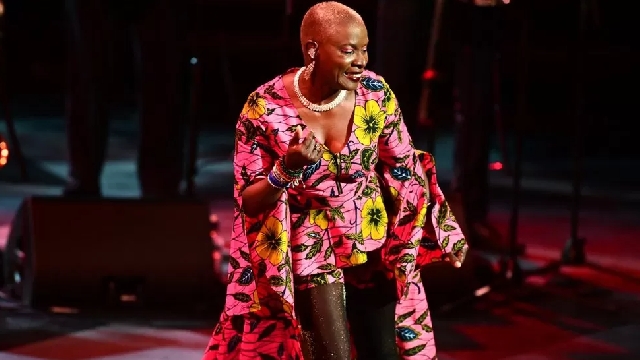Anqelique Kidjo wins 'Nobel Prize of music'
 Music icon from Benin, West Africa, Angelique Kidjo
Music icon from Benin, West Africa, Angelique Kidjo
Angelique Kidjo has been named a recipient of Sweden's prestigious Polar Music Prize, sometimes dubbed 'the Nobel Prize of music'.
Founded in 1989 by late Abba manager and lyricist Stig Andersson, it recognises exceptional musical achievements and comes with a cash prize of 600,000 kronor (£47,000).
This year's laureates also include Island Records founder Chris Blackwell and classical composer Arvo Pärt.
All three will be honoured in the presence of the Swedish Royal Family at a ceremony and banquet on 23 May at Stockholm's Grand Hotel.
"My head is still spinning," says Kidjo. "Sometimes I wake up in the middle of the night and say, 'Huh? Is this still happening?'"
The star was born in Benin, West Africa, and was introduced to a wide range of artists by her parents - from African artists like Fela Kuti and Miriam Makeba to the rock, pop, and soul of the Rolling Stones, Jimi Hendrix, James Brown, and Aretha Franklin.
A professional singer by her 20s, she faced many obstacles on her path to fame, which later inspired her battle for equal rights.
"When you're a young girl singing in Benin, and anywhere in Africa, man, you are against so many odds," she says.
"Because the society, conservative as it is, says we don't have an identity when we are born. We are a product that our father [can] take and can marry to anybody.
"And for me, my father was absolutely the person that fought family [and] society for me to be able to sing.
"That's why I say my feminism is not against men, it's against people that don't understand that women have to exist side by side with men."
Kidjo fled Benin for Paris in 1983, working as a backing singer before striking out as a solo artist with 1990's Parakou - a vibrant and innovative fusion of African and Western influences, that showcased her soulful, emotive voice.
She signed to Island Records in 1991, and has since released 14 further albums, including Eve (2014), a tribute to African women largely sung in Beninese languages, which won the Grammy for best world music album.
With African musicians like Tems, Wizkid, Libianca and Burna Boy now achieving global success, Kidjo said she was pleased to see the continent's music scene opening up.
"A lot of things have changed because of the technology of recording today," she says. "I had to flee the communist dictatorship of my country to build a career. Today, you can stay in Africa and it's instantaneous. You put something on YouTube, the next day it's a huge hit everywhere.
"Welcome to the new world!"
Source: bbc.com
Trending News

E/R: Kwabeng miner vows to protect water bodies
08:49
Youth advocate for reforms in AfCFTA to fight poverty in Africa
09:18
Political parties stage protest over CJ's suspension today!
06:39
Police assualt:Afenyo-Markin reports to police CID
10:37
MoH opens admission for nursing and public health training programmes
07:10
Sugarcane farmers urge Trade Minister to act on Komenda Sugar Factory promises
05:37
‘We should broaden our base in our next reforms’ – Bawumia to NPP
08:11
“We are going to reset Accra” – new AMA Mayor vows bold transformation
03:42
NPP not helping Chief Justice’s course –Political Science lecturer
06:59
Fire at Dzorwulu Bulk Supply Point triggers power cuts across parts of Accra
03:02



